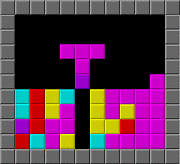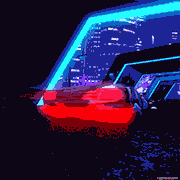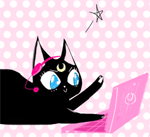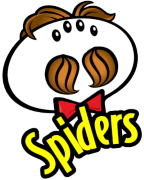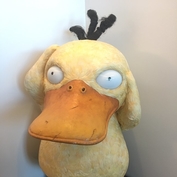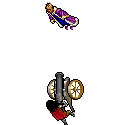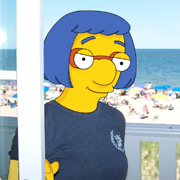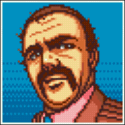|
Bros before hos, man. It's kind of indicative of the genre itself, though I don't read a whole lot of it. But I will say, the genre doesn't seem all that friendly towards women. One of the books I recommended, Azure Bonds, is part of a trilogy and I mentioned that they go down hill. You can actually see Rothfuss-like (which is to say, gross genre qualities) qualities creep in to the series as it went along and how attention towards the one powerful woman character shifts away towards the men. The first book's main protagonist is a woman named Alias. She's your typical warrior woman with extra perks due to the story and is quite good at those things, but she also has a temper, has prejudices and makes rash decisions. Her companions is a humanoid dinosaur dude who talks through scent, a mageling merchant guy who is competent but overestimates himself and his plans, and finally a shady halfling bard with lots plans and schemes. For the second book, she's no longer the protagonist. She's replaced with a person who was a jokey side-character from the first book. Who is still pathetic as he was when he was a joke except he has this whole M'Lady *tips fedora* angle to it. It also has a clone of Alias from the first book, but this clone is meek, completely subservient and falls in love with that joke character because "he's such a nice guy" who "saves her from an abusive relationship, the only relationship shes ever known." The halfling bard is back and she's the only decent character in the book because her character actually improves and learned from the first book, but she spends the first half of the story transformed as a donkey and doesn't really have much agency over the grand events. I can't go into details about the absolutely terrible character developments in the third book because it ties into story of the first book, which I think is a solid read, but Alias is back but she has no agency in the plot and instead her male companions are the actual heroes of this book. She gains character traits that extremely diminish her character and there's a plot point that's creepy as all gently caress (and Alias's reaction to it is equally gross). The point being that over the course of these books women went from being hyper-competent (like most protagonists in fantasy) to being meek waifus who needed the big strong men to come and help them and/or their agency in the story is completely diminished to the point where a literally anything can do what they do in the story. The sad thing is reviews often say the last two books are better than the first, which I think is just wrong. But it's like the first book was trying to be bold but the genre and its audience pushed back and didn't want a woman be the hero so instead she's replaced with a neckbeard. Part of the reason why I tried out these books is because I heard that Rothfuss was a feminist, so I thought the women in his books would be, if not well-written, at least well represented and not accessories for the protagonist. Unfortunately, that's not the case in 98% of them. But seriously, Azure Bonds is awesome.
|
|
|
|

|
| # ? May 26, 2024 19:22 |
|
Lottery of Babylon posted:It's pretty ironclad. Devi is a woman because she offers to sleep with Kvothe, which colors a lot of their ambiguously flirtatious interactions and gives her a position similar to Auri and Fela: not officially Kvothe's love interest, but still one of Rothfuss's waifus. She's still the best-written woman in the series, but that is more a condemnation of how the others are written than praise for her. Tempi being a woman would have been so much better.
|
|
|
|
That would have made a lot more sense. And she'd be one of only 3 women in the story I can think of that didn't drench their chair because Kvothe talked to them.
|
|
|
|
Jimbot posted:It's kind of indicative of the genre itself, though I don't read a whole lot of it. But I will say, the genre doesn't seem all that friendly towards women. Read fantasy written by women and most of the time this isn't an issue.
|
|
|
|
The genre not being woman-friendly is a huge understatement. This is true both in terms of the stories that get told and the ones doing the telling. And it's true that if you want more inclusive, diverse stories that break out of the mold of quasi-feudal/"medieval" ye olde fantasie jerking jizz-dust out of Tolkien's desiccated corpse with a cast of Competent (White) Male Heroes and their Beautiful Supportive Ladies you should turn to female authors and POC authors. Not only is the cast of characters more diverse, I've found the settings are often more interesting as well. Men who are convinced of their own feminist cred have very little impetus to critically reflect on problems of sexism and misogyny in their writing. They can't get to that step unless they're willing to admit there might be a problem, even if that problem isn't really their "fault" per se. Rothfuss can't seem to grasp the idea that there might be flaws in his writing that come from his own biases, so that's what we get.
|
|
|
|
i believe rothfuss has pea-sized testicles that are offputtingly hard to the touch and wrinkled like a washerwoman's fingertips
|
|
|
|
This has been beaten to death in the Wheel of Time thread, but despite it's issues in the world of 2016, for 1990 Robert Jordan was genuinely progressive towards women.
|
|
|
|
I fully support weaponising BravestOfTheLamps, and would like to see his takedown of WoT.
|
|
|
|
That would probably mean having to turn him into Jordan's biggest fan. There are some atrocities people can only inflict on themselves.
|
|
|
|
|
tugs braid, smooths skirt
|
|
|
|
First I'll read a 26-part series of autobiographical novels by Finland's Proust.
|
|
|
|
Strom Cuzewon posted:I fully support weaponising BravestOfTheLamps, and would like to see his takedown of WoT. Wheel of Time actually has a story and characters. Jordan's weird ticks and fetishes aside, that already puts it head and shoulders above Kingkiller.
|
|
|
|
Atlas Hugged posted:Wheel of Time actually has a story and characters. Jordan's weird ticks and fetishes aside, that already puts it head and shoulders above Kingkiller. True, and there are bits of it that are genuinely interesting. But it's diluted through so many chapters of nothingness that it's basically homeopathic storytelling.
|
|
|
|
Lightning Lord posted:Read fantasy written by women and most of the time this isn't an issue. Reene posted:The genre not being woman-friendly is a huge understatement. This is true both in terms of the stories that get told and the ones doing the telling. And it's true that if you want more inclusive, diverse stories that break out of the mold of quasi-feudal/"medieval" ye olde fantasie jerking jizz-dust out of Tolkien's desiccated corpse with a cast of Competent (White) Male Heroes and their Beautiful Supportive Ladies you should turn to female authors and POC authors. Not only is the cast of characters more diverse, I've found the settings are often more interesting as well. Any recommendations?
|
|
|
|
Jimbot posted:Any recommendations? N. K. Jemisin is pretty good.
|
|
|
|
Catheryne Valente, Nnedi Okorafor, Connie Willis...
|
|
|
|
|
I found Valente kind of pedantic. I gave up on Deathless halfway through because nothing was happening.
|
|
|
|
Lightning Lord posted:Read fantasy written by women and most of the time this isn't an issue. I mean to some extent that's our problem if we call ourselves fans of the genre but I can't help but think it might also be a publisher/advertising thing where these names don't get put out there as aggressively.
|
|
|
|
Jimbot posted:Any recommendations? Aside from the ones are mentioned, who are all good choices: Patricia McKilip, Octavia Butler, Joanna Russ, Kelly Link, Emma Bull, Leigh Brackett, Karen Lord, C.L. Moore, Alice Sheldon (who wrote under the name James Tiptree, Jr.) Diana Wynn Jones, Nalo Hopkinson, Susanna Clarke, Nicola Griffith, A.M. Dellamonica, Jane Yolen and Shirley Jackson are all authors I've enjoyed off the top of my head. I like the short story collections of Ellen Datlow and Terri Windling, but they're mostly editors, not authors. Women editors in fantasy and sci-fi are important though. I look at Virginia Woolf's Orlando as having fantasy elements and being influential, so that's a good bet too.
|
|
|
|
Christine de Pizan.
|
|
|
|
Oops, forgot C. J. Cherryh as well. Someone will (rightly) eat me alive for saying this but you can actually get a reasonable list of women writing from the Hugo/Nebula/Locus nomination lists. A bunch of these women have been on them recently. N. K. Jemisin is "famous" for being the part of a very public blowup involving the SFWA and racist abuse, so it's odd to me that more people haven't heard of her. It's sad, because she might be more known for that than for her actual writing (which I really do like).
|
|
|
|
Nakar posted:One of the biggest issues is these authors exist but it's hard to find them unless you ask around. There is a 0% chance I would've read or even heard of the names from the last few posts if I hadn't seen this exact question asked in another thread a year or two ago. These people have not just started writing stuff, either, they just seem to go completely unspoken-of in the main genre dialogue unless someone explicitly brings them up in the context of female authors. It's not a quality thing either, most are as good or at least no worse and usually a bit less cringeworthy. Yep, it's part and parcel of the disposable past of the genre causing people to be ignorant of its history and also where the mainstream marketing priorities are. Why put a marketing push behind Brown Girl in the Ring, despite all the awards it won, when Slashface Chronicles: A Ninety Part Epic of Epics makes so much money? I mean I like sword and sorcery too, I even like Conan and I think that's a perfectly valid genre. There's even some diversity there that gets swept under the rug. Charles Saunders' Imaro, or C.L. Moore's Jirel of Joiry for example. Lightning Lord fucked around with this message at 00:07 on Jul 29, 2016 |
|
|
|
I liked The Goblin Emperor although it seems to an incredibly specific sub-niche in fantasy.
|
|
|
|
Elizabeth Bear is pretty good. I enjoyed Karen Memory a lot despite generally hating the aesthetic of steampunk. Ursula LeGuin probably goes without saying, but I'll say her anyway. Her most famous stuff is a good example of someone who actually cleaves pretty closely to the classical/mythological-toned fantasy genre but does it in such a way that it feels fresher than a lot of other work that comes out.
|
|
|
|
Margaret Atwood also tends to dabble in the speculatives (most famously with A Handmaid's Tale), though I personally find it a bit weaker than her more grounded works.
|
|
|
|
HIJK posted:I found Valente kind of pedantic. I gave up on Deathless halfway through because nothing was happening. Deathless does that. I also think its one of her weaker works because of it. Palimpsest and The Orphans Tales are both much better.
|
|
|
|
me
|
|
|
|
LET’S READ THE KINGKILLER CHRONICLE CRITICALLY Part 33: “The Waystone Inn lay in silence, and it was a silence of three parts.” The Epilogue, “A Silence of Three Parts,” follows the same formula as the prologue. The Waystone Inn is in silence, held in dread of the Death that may never come. quote:It was night agan. The Waystone Inn lay in silence, and it was a silence of three parts. This prologue/epilogue formula is very adept at conveying pressing tension to the reader, except that pressing tension is the text’s own claustrophobic confusion. It’s rather like a microcosm of Rothfuss’s stylistic failures: he elaborates on something that is not true. Here he confuses silence as absence and silence as the tension absence produces. Moreover, silence has no parts. These aren’t parts of a silence, they’re three distinct silences. The rhythm built with each successive sentence distracts from the bizarre quantification. Take note again of the nonsense phrases: “quiet, made by things that were lacking,” “deep and wide as autumn’s ending,” “heavy as a great river-smooth stone,” “the patient, cut-flower sound of a man who is waiting to die”. Again, these don’t actually describe anything. As noted so long ago, they’re so broad that they occupy and haunt the reader’s imagination, despite the fact that they do not mean anything. How is autumn’s ending deep and wide? How is a river-smooth stone particularly heavy? How does one make a quiet? What is the sound of man waiting to die? These are all motifs so powerful yet so meaningless that they produce claustrophobia. This is the tension and enchantment that the reader feels. One may call this exemplary failure, or more accurately hackwork. As above, so below, the repeated stylistic goofs reflect the halted narrative. After so many pages between the prologue and epilogue, very little has changed. The Name of the Wind begins with a man waiting to die, and ends with the same man still waiting to die. There is no answer as to why he is waiting to die, save for suggestions to read the sequels. What the reader is left with is a story about a man explaining how his family was murdered, and how it took him months to discover that a library was badly organized. That was The Name of the Wind. I’ve spent more time and effort immersing myself in this stupid book than anyone but a few other masochists and the author himself. I’ve certainly spent more effort on it than it deserves. My bitter reward is that I understand The Name of the Wind. I take no shame in admitting that this read-through makes me Rothfuss’s biggest fan. Maybe just a little bit. And it’s all for you. It’s simply because I want to liberate you from the prison you have built for yourselves, The Book Barn’s Patrick Rothfuss thread. I wish to liberate you from the memes and the interminable arguments. I wish to free you from Rothfuss. I understand The Name of the Wind, and I want you to understand it too. But I find hard to do the book justice. It’s easy to dismiss The Name of the Wind as juvenile, overwritten poo poo, and in fact it’s completely correct and advisable to do so. Yet there is nuance to it. I’ve discussed Rothfuss’s work in terms of story, literary tradition, character, prose style, ideology, etc, and have found it wanting. But one of the downsides of this chapter-by-chapter format is the risk of losing sight of the forest for the trees. I could go on several different tangents from here, but let’s try to see the forest for the moment. I’ll try to be concise. Patrick Rothfuss’s The Name of the Wind is a insipid, juvenile fantasy that has no narrative save for the aggrandizement of its protagonist. It’s plot chronicles a genius gypsy turned street urchin turned student of magic turned reclusive innkeeper (among other things) narrating his rise to infamy, yet there is no real story here. Rothfuss’s first novel is longer than Herman Melville’s Moby Dick, yet he struggles to cover one consistent theme. Despite his singular focus on the hero, Kvothe, he ironically never decides what he is, leading him to shift through roles and hoard job titles without ever owning one of them. Rothfuss’s prose serves to distract, careering between high-flying nonsense and dull and anachronistic faux-realism, if unified by its droning evenness. The book is a strange patchwork of tones and affects that end up leaving no impression overall. Its setting reflects this perfectly: Rothfuss introduces names and sets, demons and magic, but he never establishes what his world is like save for basic banalities like the existence of aristocracy. He fills the page with happenstance, overlong dialogues, and fictional trivia, but The Name of the Wind ends up like its protagonist: it tempts with adventure and incident, but contains nothing true inside. Why have I written way too loving much about it? Well, I've already said it's to free you, but it's also for entertainment and practice I suppose. My appreciation of better books has deepened considerably. And it's an obviously easy target: there's a lot to mock and criticise. But we’re still not quite done here. The next few entries will be summing up some of the critical threads running through these entries. Next: “What the gently caress is The Name of the Wind about?” BravestOfTheLamps fucked around with this message at 19:01 on Apr 1, 2017 |
|
|
|
Heroes are those who plumb depths others dare not.
|
|
|
|

|
|
|
|
I think this chapter-by-chapter format is even worse than I thought, I can't actually write about the book without going on a thousand tangents. I am however finishing up Metamorphoses, a book about constantly shifting tone and topic that is also a masterpiece of world literature. BravestOfTheLamps fucked around with this message at 22:14 on Aug 4, 2016 |
|
|
|
Re: ownage women fantasy authors, Theodora Goss got left out also a good way to find better fantasy authors is to read short story collections by editors you like. With the side-benefit of ignoring names of authors and playing "guess the writer's gender!"
|
|
|
|
LET’S READ THE KINGKILLER CHRONICLE CRITICALLY Summing up, part 1 – What the gently caress is The Name of the Wind about? The Name of the Wind is a story set in another world, of sorcerers and demons. It’s about Kvothe, adventurer, sorcerer, musician, assassin, a legend living in hiding as a simple innkeeper. But as premonitions of catastrophe threaten, Kvothe finds himself recounting his life story to an intrepid scholar, from how he grew up in a band of performers only to lose his family to a supernatural tragedy, and how entered a school of sorcery to discover the truth of what had happened. It’s a story about understanding and learning, centred on the figure of Kvothe, and the reader is privy to the truths he holds. No wonder then, that the story is so hollow and without purpose or meaning. It’s hard not to be stuck how any reviewer of The Name of the Wind struggles to say what the book is about beyond its plot. Donna Bowman at the Onion AV Club tells us that it’s “a thoroughly adult meditation on how heroism went wrong”, even though most of the book only has bare hints about how heroism went wrong. Grady Smith from Entertainment Weekly says that it’s about “a fiery-haired arcanist on a lifelong journey to understand a tragedy that befalls his family”. The novel is only passingly concerned with dealing with tragedy, and it’s insight into the nature of knowledge and understanding prove lacking. The staff of Publishers Weekly say that “this outstanding debut fantasy chronicles the formative years of an orphan boy who starts his career as an actor in a traveling troupe of magicians, jugglers and jesters”. That’s just part of the plot. Even authors seem to stumble: Orson Scott Card assures us that it’s “a bildungsroman -- the story of the childhood, education, and training of a boy who grew up to be a legendary hero”. Again, that is the plot and not the whole story. Getting straight answers out of the fans is like pulling out teeth, so let’s forget about asking them. What about simple product descriptions? Amazon.com tells us that The Name of the Wind is “The riveting first-person narrative of a young man who grows to be the most notorious magician his world has ever seen”. Again, just part of the plot. What does Patrick Rothfuss’s website tell us about The Name of the Wind? quote:So begins the tale of Kvothe—from his childhood in a troupe of traveling players, to years spent as a near-feral orphan in a crime-riddled city, to his daringly brazen yet successful bid to enter a difficult and dangerous school of magic. In these pages you will come to know Kvothe as a notorious magician, an accomplished thief, a masterful musician, and an infamous assassin. But The Name of the Wind is so much more—for the story it tells reveals the truth behind Kvothe's legend. Do you see what I have to work with here? But one thing is clear: everyone knows that the book is singularly Kvothe's story.  Image by “Skadivore” via the Kingkiller Wikia. Nothing in The Name of the Wind happens without him being involved, no one acts without him taking part. But the great irony of The Kingkiller Chronicle is that despite this story being so utterly focused on the character of Kvothe, he’s ultimately very poorly defined. A character is nothing but a storytelling device, but Kvothe has no real story no matter how much Rothfuss writes. It’s why he keeps shifting through different roles: actor boy, genius prodigy, mental paragon, street urchin, thief, encyclopaedic wit, university student, sorcerer, angry young man, assertive upstart, virginal suitor, investigator, caring protector, dragonslayer, figure of terror, middle-class liberal, crotchety recluse, etc. What’s remarkable is how these roles do not clash when they logically should. His most consistent characteristics are his omnicompetence, his pride, and his touchiness, and even those come and go. You never see Kvothe’s touchiness affect his courting of Denna. He’s a mental titan whose instincts have been honed on the streets, yet he mainly pals around with the most boring, whitebread characters in the University. He appreciates the common man yet looks down on the parochial and the religious. It’s certainly not a depiction of how multifaceted people can be, because there is no realism to a prickly teenage genius prodigy polymath penniless gypsy middle-class musician apprentice artisan wizard. And it’s no post-modern statement on the artificiality of identity, even with some nods to some of these being roles in the performative sense. Easy enough a syllogism: the story is about Kvothe, but Kvothe is nothing, and therefore the story is about nothing. But is it really that simple? There’s always a choice of reading The Name of the Wind as satire, but the sheer bulk crushes any hope of that. There’s simply not enough satire to justify the page count. It’s an exercise in the aggrandisement of a fictional character, expressed through a featureless fantasy world. It’s a story about how exceptional Kvothe is. That’s it. quote:My name is Kvothe, pronounced nearly the same as “Quothe.” Names are important as they tell you a great deal about a person. I’ve had more names than anyone has a right to. Next: How (badly) The Name of the Wind reads. BravestOfTheLamps fucked around with this message at 19:03 on Apr 1, 2017 |
|
|
|
Why would a language have a word whose meaning is, "The Broken Tree?" Do they have a word for, "The Watermelon Kneecap?"
|
|
|
|
quote:My first mentor called me E’lir because I was clever and I knew it. My first real lover called me Dulator because she liked the sound of it. I have been called Shadicar, Lightfinger, and Six-String.
|
|
|
|
BlackFrancis posted:Why would a language have a word whose meaning is, "The Broken Tree?" An agglutinative one?
|
|
|
|
Perhaps a hamster posted:I like how about half of those are undefined nonsense words that mean absolutely gently caress all. Like, having one of the previous quotes in mind, what is 'Shadicar' supposed to tell about a person, exactly? No one has called him Dulator yet either. So his first lover was neither the literal goddess of sex who took his virginity nor the busty waitress with her sex-sense. Nor any of the other sex ninjas/girls he nailed but never naimed.
|
|
|
|
'Dulator' just makes me think he must be really dull in bed, so that's a pro choice for a lover's nickname right there.
|
|
|
|
Perhaps a hamster posted:I like how about half of those are undefined nonsense words that mean absolutely gently caress all. Like, having one of the previous quotes in mind, what is 'Shadicar' supposed to tell about a person, exactly? Also the part where he interprets the three meanings of a title could've maybe been interesting had there been a hint of intentional parodic self-aggrandizement to it. There's no possible way that by sheer happenstance he got a (made-up, fantasy language) nickname that has three meanings all of which happen to apply, but it's almost tolerable as a narrator trying to make himself seem even more important by stretching to make all three names fit. Except it's done almost effortlessly, and there's no sense of really stretching other than the "broken tree" which he already admits wasn't stretching anyway. I mean, if you did something like "They call me ajupah, which in their language can mean 'Whirlwind,' 'Homewrecker,' or 'Toilet;' to this day I'm not sure which of those is the one they intended," now you have some self-deprecation. If the three terms couldn't possibly all be the same word ("It can mean 'Mountaintop,' 'Your Cousin's Aunt,' or 'That Sweat On Your Forehead That Keeps Rolling Into Your Eyes'"), you have a self-aware poke at the genre's tendency to make up words with no linguistic foundation. If the three terms are vaguely related but have to be puffed up to fit properly, you have an unreliable narrator who is trying to make themselves sound cool.
|
|
|
|

|
| # ? May 26, 2024 19:22 |
|
I see BravestOfTheLamps is rocking a Kill Six Billion Demons avatar. Now I'm more in agreeance with him than ever.
|
|
|





